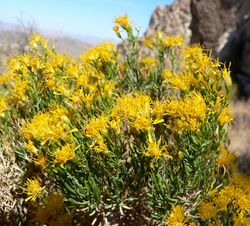Biology:Ericameria laricifolia
| Ericameria laricifolia | |
|---|---|

| |
| Scientific classification | |
| Kingdom: | Plantae |
| Clade: | Tracheophytes |
| Clade: | Angiosperms |
| Clade: | Eudicots |
| Clade: | Asterids |
| Order: | Asterales |
| Family: | Asteraceae |
| Genus: | Ericameria |
| Species: | E. laricifolia
|
| Binomial name | |
| Ericameria laricifolia (A.Gray) Shinners
| |
| Synonyms[4] | |
| |
Ericameria laricifolia is a North American species of flowering shrub in the family Asteraceae known by the common name turpentine bush, or turpentine-brush. It is native to the southwestern United States (Arizona, New Mexico, western Texas , southwestern Utah, southern Nevada, southeastern California ) and northern Mexico (Chihuahua).[5][6]
Ericameria laricifolia grows in desert scrub and woodlands. It is a shrub reaching 50–100 cm (20-40 inches) in height, is generally hairless, somewhat glandular, and aromatic. It sometimes has naked stems at the base but the upper branches are densely foliated in needlelike, pointed leaves one to three centimeters (0.4-1.2 inches) long. The many erect branches bear inflorescences of bright golden yellow flower heads, each with up to 16 long disc florets and as many as 6 ray florets.[7]
References
- ↑ Tropicos, Aster laricifolius (A. Gray) Kuntze
- ↑ Tropicos, Haplopappus laricifolius A. Gray
- ↑ Gray, Asa 1853. Smithsonian Contributions to Knowledge 5(6): 80–81 as Aplopappus laricifolius
- ↑ The Plant List, Ericameria laricifolia (A.Gray) Shinners
- ↑ Biota of North America Program 2014 county distribution map
- ↑ Calflora taxon report, University of California, Ericameria laricifolia (A. Gray) Shinn., turpentine brush, turpentine bush
- ↑ Flora of North America, Turpentine bush, Ericameria laricifolia (A. Gray) Shinners, Field & Lab. 18: 27. 1950.
External links
- Jepson Manual Treatment
- United States Department of Agriculture Plants Profile
- Calphotos Photo gallery, University of California
- Photo of herbarium specimen at Missouri Botanical Garden, collected in New Mexico in 1851, isotype of Aplopappus laricifolius/Haplopappus laricifolius/Ericameria laricifolia
Wikidata ☰ Q5387977 entry
 |

